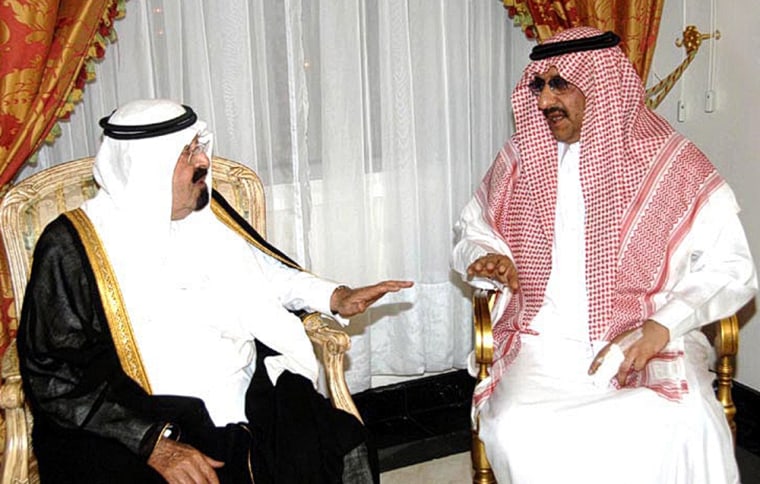The man in charge of Saudi Arabia’s counter-terrorism campaign, Prince Muhammad bin Nayef was slightly wounded in a terrorist attack Thursday.
As a favorite of U.S. intelligence and counterterrorism officials, the brazenness of the attempted assassination of Saudi’s counter-terror czar is significant because his loss would have been a major victory for al-Qaida.
The attack occurred when a suicide bomber blew himself up just before going into a Ramadan gathering in Jiddah, the state news agency said.
With the official title of deputy minister of the interior for security affairs for nearly a decade, bin Nayef is well connected within the royal family.
In his early fifties, bin Nayef is the son of Interior Minister Prince Nayef bin Abdul Aziz, the brother of the nation's ambassador to Spain and the nephew of Saudi King Abdullah.
Bin Nayef is regarded by senior U.S. counterterrorism officials as part of the “new breed” of Saudi officials. He is someone who they see several times a year, who they trust and who they believe has cleaned up the Saudi equivalent of the FBI, which has been long suspected of incompetence as well as disloyalty. During the Bush administration, bin Nayef met regularly with National Security Council Counter Terror Director Fran Townsend and FBI Director Robert Mueller.
Father not always a favorite
But, his father and boss has not always been a favorite of American officials. Nayef, 76, is seen as anti-American and not as anti-radical as the U.S. would like him to be.
Even though Osama Bin Laden singled out Nayef (along with the late King Fahd and then defense minister, now crown prince, Sultan bin Abdul Aziz al Said) as “the source of the disease” in Saudi Arabia, he was one of the Saudi ministers who suggested that the 9/11 attacks were not conceived in Islam. Rather, he hinted darkly, bin Laden was “a tool” of others because the Saudi hijackers did not seem to have “the capability to act in such a professional way.” The suggestion was that Saudi Arabia was not responsible for the attacks.
Nayef also ran the “Saudi Committee for Support of the Al-Quds Intifada,” which has distributed tens of millions of dollars to Palestinians, including payments to the families of “martyrs,” or suicide bombers, as well as those whose homes have been destroyed by the Israeli military. Nayef is also general supervisor of the Joint Saudi Committee for the Relief of Kosovo and Chechnya.
Counterterror street cred
But the younger prince’s image has been burnished inside the royal family by his successes in the counterterrorism effort. After years of being seen as a virtual non-entity in the Saudi royal family — or worse, a corrupt prince — bin Nayef has used has his counterterror portfolio to raise his profile.
Simon Henderson, the Financial Times reporter who tracks the ups and downs of the Saudi royals, dismissed bin Nayef in his 1994 book, “After King Fahd,” as “not considered significant in the leadership stakes.”
But a decade later, in a piece for the Washington Institute in December 2004, Henderson described bin Nayef as one of a handful of “prominent” princes “in their fifties or sixties and with considerable administrative experience.”
He has received credit for the success of the sweep against al-Qaida in recent years, especially since militants first struck the kingdom in May 2003. As recently as Aug. 19 he oversaw the arrest of 44 suspected militants with al-Qaida links. In general, he has been credited with an aggressiveness uncommon among the leaders of the older generation.
But he has also met with families of Saudis who have being held at Guantanamo. And perhaps more significantly, he has gone to Saudi universities to meet with young al-Qaida sympathizers.
His most public appearance came when the then-top figure in al-Qaida, Ali Al-Ghamdi, surrendered to him personally in June 2003.
He has also pushed the cultural campaign that terrorism hurts everyone and even provided the foreign media with interviews and video news releases on successes in the hunt for al Qaida.
Bin Nayef, however, was not always seen as someone who understood the threat. Prior to the May 2003 attacks on a U.S. residential compound, U.S. officials had warned his office that attacks were planned and could happen at any time.
Bin Nayef, said U.S. officials, did not take the threat or the intelligence seriously and was criticized for not beefing up security when the attack took place.
